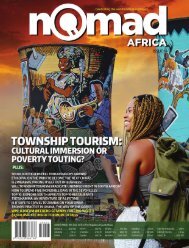Nomad_Africa_Edition12
Born from a passionate desire to dispel the negative perceptions which the world has held of the African Continent, and to replace it with a positive focus, Nomad Africa magazine celebrates life on the African continent. Covering stories from all countries and all cultures, it strives to include unique tourist attractions, business development, technology and investment opportunities as well as looking at the continent's cultural heritage. Nomad Africa inspires and breeds a conscious, knowledgeable generation of visionaries among our own, and influences positive perceptions and appreciation for the true worth of Africa worldwide.
Born from a passionate desire to dispel the negative perceptions which the world has held of the African Continent, and to replace it with a positive focus, Nomad Africa magazine celebrates life on the African continent. Covering stories from all countries and all cultures, it strives to include unique tourist attractions, business development, technology and investment opportunities as well as looking at the continent's cultural heritage. Nomad Africa inspires and breeds a conscious, knowledgeable generation of visionaries among our own, and influences positive perceptions and appreciation for the true worth of Africa worldwide.
Create successful ePaper yourself
Turn your PDF publications into a flip-book with our unique Google optimized e-Paper software.
Nelson Mandela<br />
NELSON MANDELA<br />
100 YEARS AFTER<br />
What is it that makes a leader stand out not only among men,<br />
but also among his peers? Is it their vision or courage? Or perhaps the<br />
ability of the leader to lead where others fear to tread?<br />
Words: BRUCE GERMAINE<br />
RISE OF A REVOLUTIONARY<br />
Already an independent mind, it was just a<br />
matter of time before he joined the <strong>Africa</strong>n<br />
National Congress in 1942.<br />
During those early turbulent years in Johannesburg,<br />
Mandela was introduced to the<br />
realtor and ANC activist Walter Sisulu, who<br />
secured him a job as an articled clerk at<br />
law firm Witkin, Sidelsky and Eidelman. The<br />
company was run by a liberal Jew, Lazar<br />
Sidelsky, who was sympathetic to the<br />
ANC's cause.<br />
Mandela realised that the ANC’s old tactics<br />
of polite petitioning were ineffective and<br />
in 1949, the ANC officially adopted the<br />
Youth League's methods of boycott, strike,<br />
civil disobedience and non-co-operation<br />
with policy goals of full citizenship, redistribution<br />
of land, trade union rights, and<br />
free and compulsory education for all chilit<br />
is all of those qualities and so<br />
much more that took Nelson Rolihlahla<br />
Mandela on a life changing<br />
journey from the a small village of<br />
Mveso, a rural area of the Transkei<br />
in the Eastern Cape of South <strong>Africa</strong><br />
to being South <strong>Africa</strong>’s first democratically<br />
elected black president<br />
in 1994. A journey marked by a<br />
continuous struggle against inequality,<br />
racism, poor education and poverty despite<br />
being imprisoned by the South<br />
<strong>Africa</strong>n white minority powers in 1963.<br />
Mandela’s early life took a significant turn<br />
when Chief Jongintaba Dalindyebo, the<br />
acting regent of the Thembu people,<br />
adopted him after his father’s death. He<br />
was nine years old. Having to relocate<br />
from the village of Qunu to the more sophisticated<br />
environment of Mqhekezweni,<br />
the provincial capital of Thembuland, the<br />
chief's royal residence, Mandela was destined<br />
for greater things and given the same<br />
status and responsibilities as the regent's<br />
two other children.<br />
After school, the University College of Fort<br />
Hare in Eastern Cape, the only residential<br />
centre of higher learning for black <strong>Africa</strong>ns<br />
in South <strong>Africa</strong> at the time beckoned, drawing<br />
scholars from all parts of Sub-Sahara<br />
<strong>Africa</strong>.<br />
In his first year at the university, Mandela<br />
took the required courses, but focused on<br />
Roman Dutch law to prepare for a career in<br />
civil service as an interpreter or clerk—regarded<br />
as the best profession that a black<br />
man could obtain at the time, bearing in<br />
mind that South <strong>Africa</strong> was a British colony<br />
at the time ruled by white people.<br />
But it was in his second year when Mandela<br />
was elected to the Student Representative<br />
Council that student politics played<br />
a major role. For a while, students had<br />
been unhappy with the food and lack of<br />
power held by the Student Representative<br />
Council (SRC). A boycott was launched and<br />
Mandela resigned from his SRC position.<br />
This was, according to the authorities, an<br />
act of insubordination and they demanded<br />
he serve on the SRC. The regent, head of<br />
his adopted family, was also furious and<br />
demanded from Mandela that he recants<br />
his position and return to Fort Hare.<br />
Seeing this as an act of insubordination, the<br />
university's Dr Kerr expelled Mandela for<br />
the rest of the year and gave him an ultimatum:<br />
He could return to the school if he<br />
agreed to serve on the SRC. When Mandela<br />
returned home, the regent was furious,<br />
telling him unequivocally that he<br />
would have to recant his decision and go<br />
back to school. While back at home, he received<br />
news that the regent had arranged<br />
a marriage for him as was custom, but<br />
shocked by this news and recent events,<br />
Mandela departed from his family home<br />
and settled in Johannesburg, working a variety<br />
of jobs while completing his bachelor's<br />
degree via correspondence courses<br />
and eventually enrolling at the University<br />
of Witwatersrand in Johannesburg to study<br />
law.<br />
Issue 12 | ...Celebrating the world’s richest continent | www.nomadafricamag.com | 75





